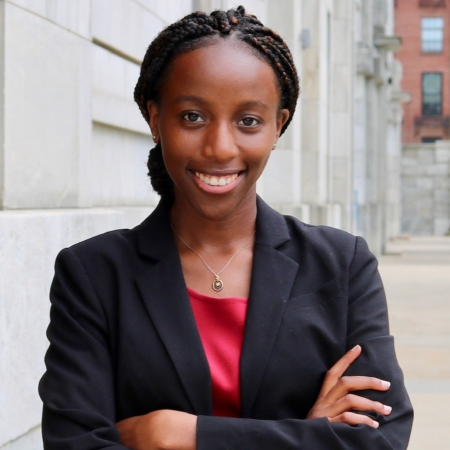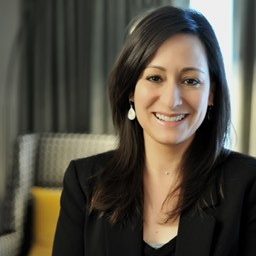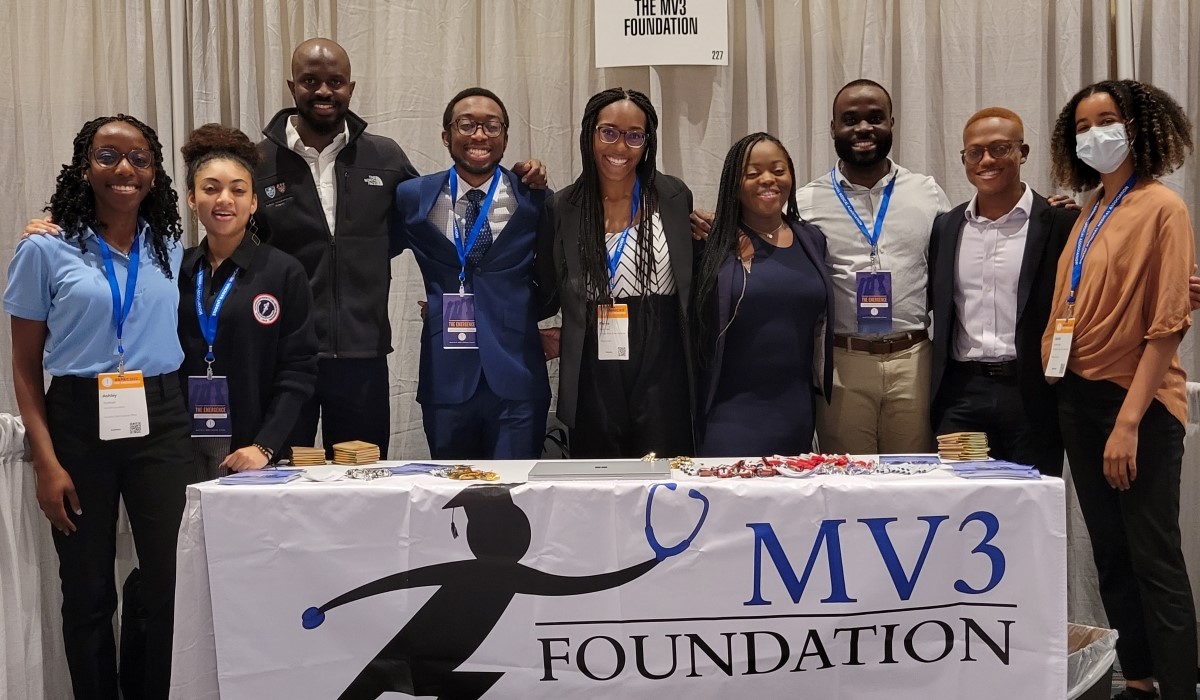Meet Daily Point of Light Award honoree Ashley Kyalwazi. Read her story and nominate an outstanding volunteer or family as a Daily Point of Light.
The daughter of Ugandan immigrants, 26-year-old Ashley Kyalwazi faced many challenges navigating her way as a first-generation African-American college student.
“A lot of what I learned was through first-hand trial and error navigating systems I didn’t have exposure to,” says Ashley. “For Black students in the U.S., there are many potential barriers to entering careers in health and biomedical sciences including financial constraints, lack of adequate exposure to healthcare or biomedical science and lack of appropriate advising. There were times when I was one of a couple of Black students in large science courses of over 100 students. When you don’t see enough people who look like you on the path you are on, it’s incredibly important to have access to a community of individuals who can support you.”
The Harvard Medical School (HMS) student currently lives in Boston, Massachusetts. Ashley says that an advisor even once told her to consider studying business instead of medicine. Explaining how “those experiences mount,” Ashley founded the MV3 Foundation in 2020 to empower Black undergraduate scholars pursuing careers in health and biomedical sciences.
Through a dynamic curriculum, comprised of both academic and professional development opportunities, MV3 Foundation seeks to invest in the personal and professional growth of Black undergraduate students at a key time in their early careers. Since launch, MV3 has served around 20 scholars across the nation and more than 50 graduate students have joined the organization’s efforts as volunteers, paving the path to success that Ashley says she longed for in her formative years.
“I wish I’d had more people in medicine to tell me, ‘you’re doing well, you’re on track, your dreams are valid and you can get there.’ Fortunately, I was able to be surrounded by organizations like the Jackie Robinson Foundation (as a scholar) that did serve as a catalyst for my own personal development. That was the reason I was able to make it. We’re all different but everybody has a similar narrative. The unifying theme with all students is that they had inappropriate mentorship or lack thereof. They need to have someone see them and empower them. That’s what motivates me.”

Supporting students who will impact the future of health and biomedical sciences by mobilizing voices through the three MV3 pillars: education, service and advocacy, Ashley, who also serves as chief executive officer of the organization, says programs like MV3’s Academic and Professional Development offer MV3 scholars the chance to obtain one-on-one mentorship from a current medical, dental and graduate student, as well as group-based mentorship by a Black health and/or biomedical professional. MV3 also hosts monthly webinars with healthcare and biomedical professionals to increase access to opportunities in these careers.
“(Education is) an inequitable system. It favors people with greater resources, a greater network and higher income. I wanted to do my part towards creating a safety net based on my personal knowledge and the gaps for Black students who don’t have exposure, but have dreams of entering these spaces.”
The impact MV3 has had on Black students is measurable progress Ashley wants to see more of in the future.
“It’s very meaningful to listen to their experiences, challenges and hopes they have for themselves directly. The ability for a Black undergraduate scholar to be closely mentored by a Black grad student who has made it in areas they hope to get into but really need advice on how to make it is a big deal. Black scholars, speaking towards the power of being able to have access to someone who looks like them and has made it, makes me really proud of our scholars, mentors and organizations, and where we can go from here. The future looks like a more diverse and inclusive healthcare and biomedical science workforce comprised of individuals who represent the increasingly diverse population of the U.S. It’s one where students of color, students from low SES (socioeconomic status) backgrounds and students in under-resourced areas don’t fear their chances of achieving their goals because pathways to medicine and science are equitable and resources are equitably distributed.”
By building a network for Black students, Ashley is helping to improve communities, says Leonard Nettey, a classmate of Ashley’s at HMS and chief operating officer and research lead at MV3.
“Through the foundation, Ashley is helping to empower Black undergraduates who are interested in biomedical science and medicine across the U.S.,” says Leonard. “She’s helped build a comprehensive mentoring curriculum and professional network for these students, but beyond the work for the students, she’s also connecting Black scientists and physicians, really creating a comprehensive community to improve Black health in the U.S.”
Recalling a famous Jackie Robinson quote, “A life is not important except in the impact it has on other lives,” Ashley is making her mark on the world through her service, and urges other young volunteers to do the same.
“It’s never too early to start giving back and investing in people. We all have a unique set of perspective, gifts and skills. Recognizing and leveraging your own God-given talents and story is key to having a meaningful impact and everyone is capable of positively impacting people.”
Do you want to make a difference in your community like Ashley Kyalwazi? Find local volunteer opportunities.
This post was written by Points of Light staff. Points of Light collaborates with voices from various writers to help tell inspirational stories of leadership, volunteerism and civic engagement. We recognize that there are many ways to be civically engaged, as outlined in Points of Light’s Civic Circle, and we are grateful to our writers for helping us illustrate the impact of how everyday actions can change the world.


